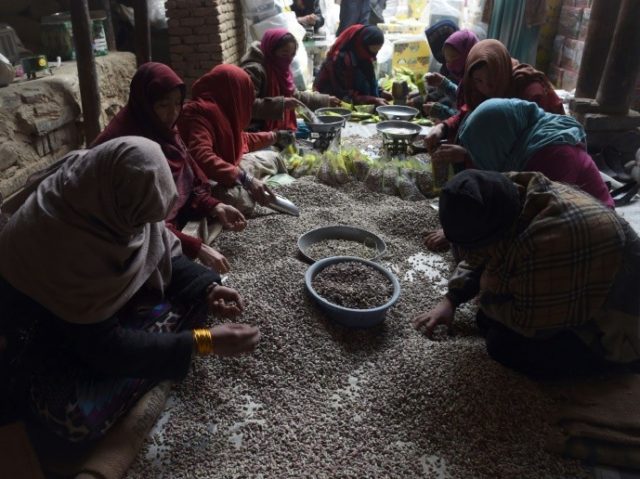Taliban jihadists generated $15 million for terrorist activities in 2016 from harvesting Afghanistan’s “green gold,” pistachios, over 32,000 hectares in the Kushki Kuhna district of the country’s western Herat province.
“They are being collected by the Taliban and armed locals,” lamented the head of the Badghis governor’s office, Sharafuddin Madjeedi, referring to the pistachios, reported Agence France-Presse (AFP) last year.
Syed Mohammad Chishti Modudi, the Kushki Kuhna district’s administrative chief, told Pajhwok Afghan News that “an investigation by agriculture experts showed $15 million in annual income from [the] pistachio crop in the district lined [the] Taliban’s pockets.”
“He said two pistachio forests spread over 32,000 hectares of land existed in the district,” notes Pajhwok, adding that “the forests had been partially destroyed by local powerful individuals and Taliban.”
However, the Taliban managed to illegally harvest up to 40 percent of the country’s crop after it raided the pistachio forests in Herat last year.
Afghanistan’s “pistachio belt” runs through the provinces of Badakhshan in the northeast; Kunduz in the north; and Herat in the west.
The U.S.-backed Afghan National Defense and Security Forces (ANDSF), which include soldiers and police officers, are unable to protect some pistachio forests in the war-devastated country because the Taliban closely monitors them and towns nearby.
“Government forces have no authority over the pistachio forests in Badghis province because they lie in Taliban-controlled areas,” explained Hafizullah Benish, agriculture director in the western province.
As of mid-November 2016, the Kabul-based government had lost control and/or influence of about 43 percent of Afghanistan.
Known as Afghanistan’s green gold, Afghans proudly harvest world-class pistachios, noted Agence France-Presse (AFP) in July 2016, adding that the Taliban had laid its eyes on the lucrative crop.
Over the past few years, Afghan authorities have imposed a ban that makes it a crime to access pistachio forests in 11 provinces.
Nevertheless, the restrictions have failed to serve as a deterrent for Taliban and other “strongmen” in the country.
“Fears are growing that the Taliban and local strongmen are depriving” poor farmers in the war-ravaged country “of much-needed export income,” noted AFP.
The Taliban also generates millions from the sale of the illicit drug opium, which is primarily cultivated in Afghanistan.
U.S. Gen. John Nicholson, the top commander of American and NATO forces in Afghanistan, revealed last year that opium and its heroin derivative “provides about 60 percent of the Taliban funding.”
Taliban jihadists “tax the farmers, they tax the narcotics traffickers and this is how they derive their revenue,” the top American general explained to Pentagon reporters.
It appears that the Taliban generates a substantial portion of the remaining 40 percent from the harvest of pistachios.
Pistachio profits are “not enough to compete with opium production that generates, according to the UN, about $160 million a year in Afghanistan. But enough, for some, to make ends meet,” pointed out AFP.
The Taliban may have more than tripled the profits from pistachios over the last two years, from an AFP estimate of $4.2 million in 2014 to about $15 million last year.
Mohammad Aman Amanyar, the forest supervisor for Afghanistan’s Agriculture Ministry, pointed out in 2016 that “nearly four decades ago, before the near continuous wars that have since ravaged Afghanistan, the country was carpeted with up to 450,000 hectares of pistachio forest.”
“Now, after violence and misery, ’40 to 50 percent of the trees are gone for firewood, or are victims of climate change and drought,'” he added.
Late last year, Gen. Nicholson determined that the ongoing war in Afghanistan is at a stalemate.

COMMENTS
Please let us know if you're having issues with commenting.